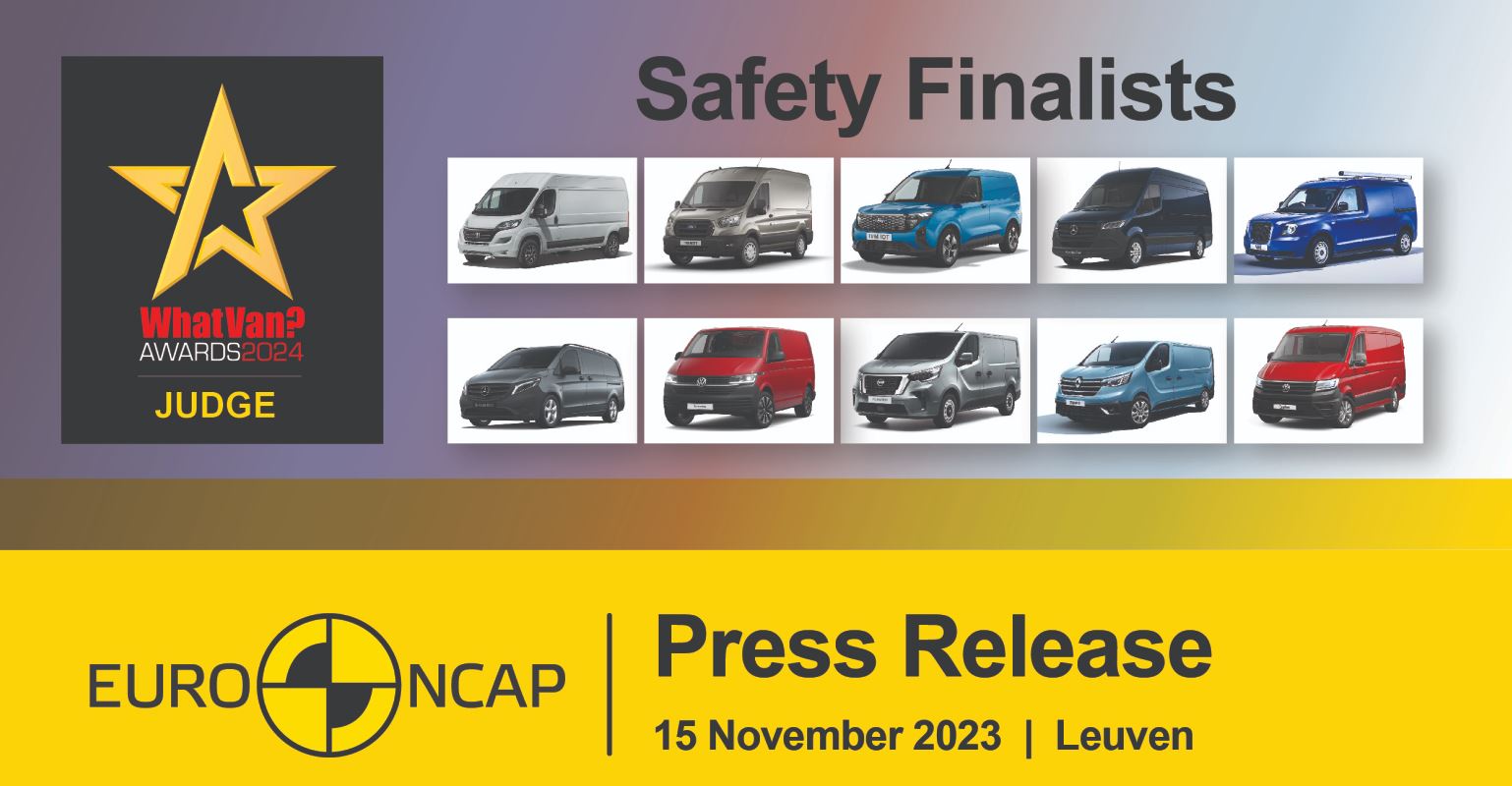
In the post-COVID era, as home delivery becomes the new normal, the number of new commercial vans on European roads has increased by 23% compared with pre-pandemic levels. While vans do not necessarily have a higher crash rate than other vehicles, the accidents they are involved in tend to be more severe for their opponent crash partner, with an overrepresentation of deaths and serious injuries. And since many of these van crashes occur in City and Urban areas, the protection of vulnerable road users is paramount. Euro NCAP is committed to improving van safety and has published safety ratings since 2020. This year, Euro NCAP is collaborating with the What Van? Awards in the UK and judging a specific award for van safety. On 15 November 2023, Euro NCAP announced the top ten performers in the running for this Safety Award 2024.
The shape, size and weight of vans often make them aggressive opponents if they are involved in collisions with regular passenger cars or vulnerable road users. Around 6% of all fatal European crashes involve vans. The last decade has seen the development of Advanced Driver Assistance Systems which can promote safe driving and help drivers to avoid or mitigate the consequences of a collision. These technologies are commonplace in passenger cars. However, the commercial vehicle segment is an extremely price-sensitive one and safety systems are often not available on vans from manufacturers that generally fit this technology as standard to their passengers’ cars.
Euro NCAP aims to provide better information to those buying vans, whether they are an individual tradesman or a fleet ordering several thousand vehicles. The costs and consequences of vehicles being involved in collisions can be reduced by operating the safest 2 vehicles possible, leading to higher productivity, reductions in reputational risk and more favourable insurance premiums.
Put to the test, Euro NCAP has seen some noticeable differences in vans compared to passenger cars. Not all commercial vans offer the latest ADAS functionalities, such as pedestrian and cyclist detection. Some vans offer lane support systems, blind spot detection, lane departure warning or lane keep assist. Speed assist technology, if present, is mostly manual set and lacks a speed limit information function. Seat belt reminders are mostly standard for driver but absent for front passengers.
Euro NCAP has tested around 95% of the European market vans from the smaller car-derived N1 vans based on passenger cars to the larger N2 category vans with all weights of up to 5 tonnes. The top ten performers in the competition for this year’s What Van? Awards 2024 are vans that have made huge strides in improving safety. All vans have either achieved a Platinum, Gold, or Silver, rating under Euro NCAP’s strict and independent safety assessment. For the Award, vans are considered and judged for their market availability, standard vs optional fit of safety systems and value for money as well as class-leading safety performance. In alphabetical order, the vans on the short-list are:
‘Equipping vehicles in the commercial sector with modern safety solutions and the latest technological developments is a vital part of the complicated jigsaw of reaching Vision Zero and zero casualties on European roads. How can it be that vans and trucks do not have the same technology that has been available for years on passenger cars? Our collaboration with this year’s What Van? Awards 2024 on a Safety Award is just one more way how we can show committed van manufacturers our appreciation for the work they do in pushing forward van safety. This is particularly admirable in the commercial market where the bottom line is the main objective and where safety is not considered as a priority.’ Dr Michiel van Ratingen, Secretary General Euro NCAP.
A final winner of the What Van? 2024 Safety Award will be presented on 6 December 2023 at the Hilton Bankside London Hotel.
Editor’s note
For full results, visit www.euroncap.com or Euro NCAP’s newsroom for journalists.
For media information, please contact Cordelia Wilson at media@euroncap.com.
Follow Euro NCAP online and on social media:
Twitter: @euroncap
Facebook: forsafercars
Instagram: @euroncap_forsafercars
YouTube: EuroncapCom
About Euro NCAP
Euro NCAP organizes crash & safety tests on new vehicles and provides motoring consumers with a realistic and independent assessment of the safety performance of some of the most popular cars sold in Europe. Established in 1997 and backed by several European Governments, motoring, consumer and insurance organizations, Euro NCAP has rapidly become a catalyst for encouraging significant safety improvements to new car design.
Euro NCAP ratings strictly apply to vehicles of the specifications offered in Europe. The ratings do not necessarily apply to models offered in other regions, even when sold under an identical name, as production specifications and equipment may vary.